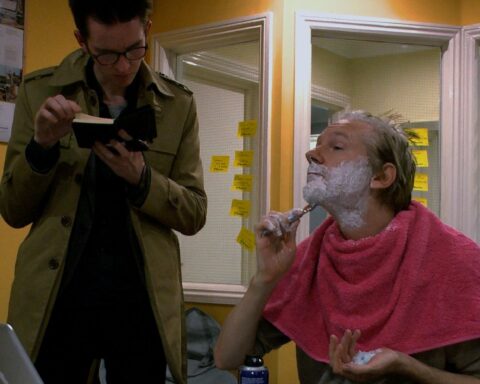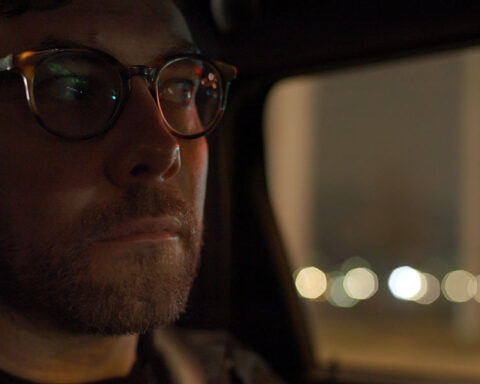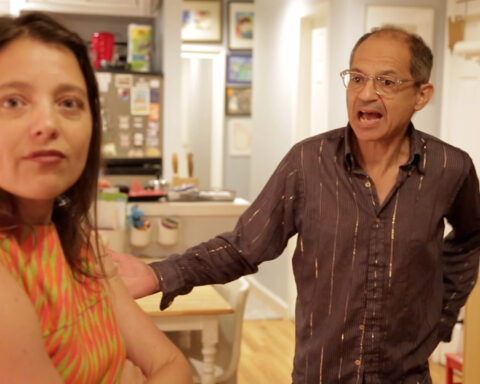Risk
(USA/Germany, 92 min.)
Dir. Laura Poitras
Featuring: Julian Assange, Sarah Harrison, Jacob Appelbaum, Jennifer Robinson, Edward Snowden
Communications, security systems and global politics have shifted dramatically since Julian Assange started WikiLeaks in 2006. An Internet startup like no other, Assange’s organisation hasn’t made billions but it’s changed the world. The complete tale of WikiLeaks may already be too complex to tell in one film but Laura Poitras has certainly made the best doc yet about Assange’s tempestuous recent life in her newly revised version of last year’s Cannes feature entry, Risk.
When American documentarian Poitras began to shoot her film about Assange in 2011, her radical credentials were impeccable. She’d already made the tough, moving My Country, My Country about Iraqis adjusting to life in their country after the U.S. invasion, The Oath about Osama bin Laden’s driver and the American war on terror, as well as several other docs, which had garnered her awards at Sundance, South by Southwest and the Full Frame documentary festival, an Oscar nomination and an Emmy.
When Laura met Julian—and this doc almost feels like a romantic film gone wrong—he’d already released the still terrifying Collateral Murder film of a strike in Iraq that killed two journalists, the infamous Afghan War Diary and, most controversial of all, the U.S. State Department cables that revealed a web of deceit from the White House across the American government, including hundreds of files about the Guantanamo Bay detainees.
In 2011, Assange was clearly hot stuff—hotter still because he’d been accused of sexual improprieties with two Swedish women. He was fighting an extradition charge that would have sent him to Sweden, where he was sure that the Americans would demand his presence on charges in the U.S. Poitras and many radicals around the world were enamoured with Assange, a charismatic elusive figure who was taking on the U.S.’s excesses globally, and seemingly beating them.
In Risk, Poitras tries to establish a personal relationship with Assange. That’s what a documentarian must do to make a great film on a story that is infinitely complex but still comes down to questions concerning the motivations of WikiLeaks’ creator. It turns out that she might be on Mission Impossible — and Tom Cruise isn’t there to help her out.
Thanks to her great earlier docs, Poitras was given easy personal access to Assange, his lover and associate Sarah Harrison, the intemperate but brilliant computer scientist Jacob Appelbaum and the rest of the main WikiLeaks team including their main lawyer Jennifer Robinson. But despite the mutual regard they must have felt for each other, Poitras is kept at arm’s length by Assange. At one point she admits that “he seems to hate me.” Poitras soldiers on, as doc-makers must, capturing the intimate friendship between Assange and the much younger Harrison and his skillful way in turning questions about the Swedish personal allegations into a political issue.
Poitras is there during Assange’s early days in diplomatic captivity in the Ecuadorean Embassy in London and, at some point, has a drink with him late at night—though no true revelations are spoken. A superb documentarian, Poitras must have realised that the footage she shot, though valuable, wasn’t worthy of a feature doc.
As Risk continues, we follow the Edward Snowden story—another WikiLeaks-style tale—in which NSA (National Security Agency) documents were leaked to the press by the former CIA employee. This is, of course, the basis of Poitras’ Oscar winning film Citizenfour. At Assange’s instigation, Harrison helped Snowden in his escape from Hong Kong to Russia (as did Poitras); the personable Harrison has since relocated in Germany, fearful of what would happen if she returned to her home in the U.K.
Risk moves to its payoff in brief footage shot in the past year, as Assange helped to derail Hilary Clinton’s campaign by releasing thousands of emails that scandalised too many Americans for her to win the election (though there seems to have been nothing illegal in any of them.) With Donald Trump President and Russia clearly behind the leaked documents, what does Assange think now? In their first personal encounter in years (apparently), Assange waxes philosophical to Poitras about “acting globally.”
Whether he was thinking globally or locally, there’s no doubt that Assange may have left the world at risk of a nuclear disaster. Poitras has made an unsettling portrait of an enigmatic figure, whose motivations might never become clear. For anyone interested in what’s happening in the world, Risk is a must-see.











